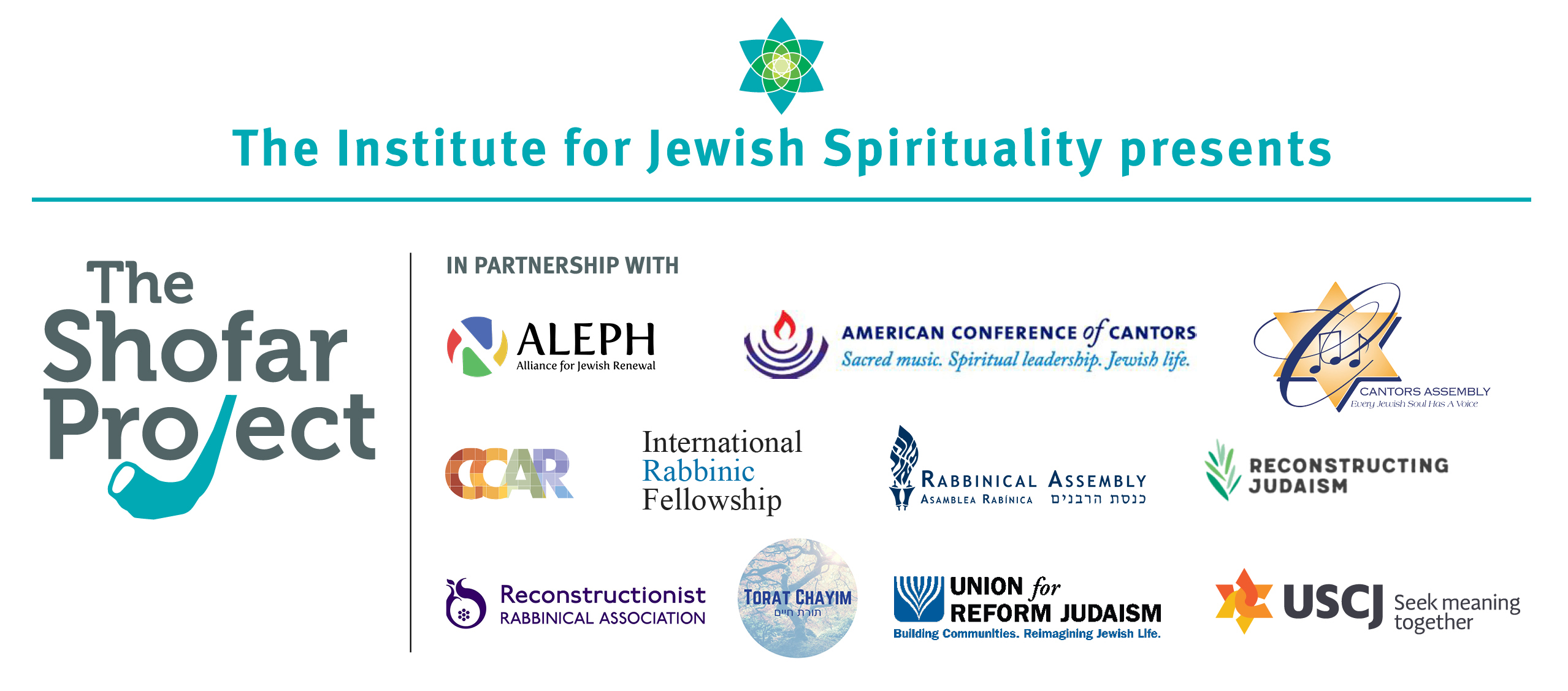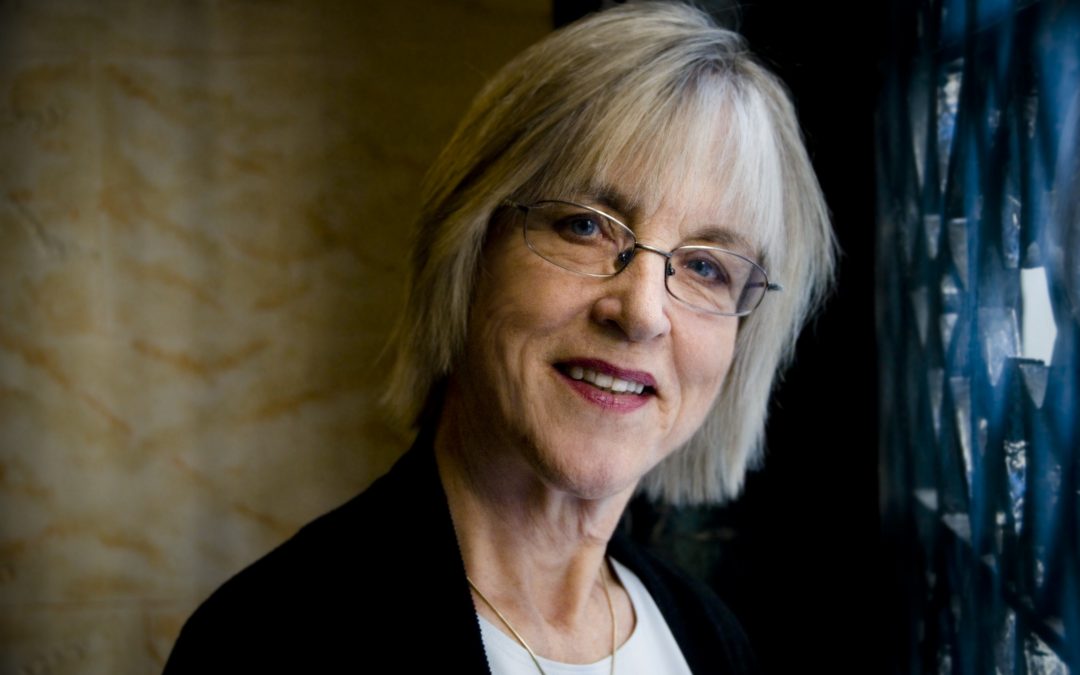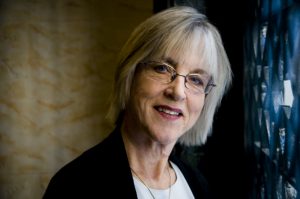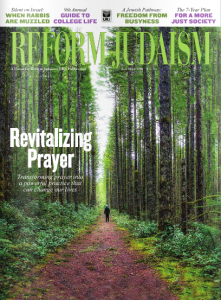Aug 7, 2020 | Uncategorized

We are pleased to announce that ALEPH, the American Conference of Cantors, Cantors Assembly, and Torat Chayim have joined The Shofar Project as our newest partners.
These four organizations join the Central Conference of American Rabbis, International Rabbinic Fellowship, Rabbinical Assembly, Reconstructing Judaism, Reconstructionist Rabbinical Association, Union for Reform Judaism, and the United Synagogue of Conservative Judaism in this historic cross-denominational partnership with the Institute for Jewish Spirituality.
The Shofar Project is a free program that runs during the month of Elul (August 20 – September 18) and includes daily Jewish mindfulness meditation sits led by clergy from the partner organizations, weekly Torah study, and a twice-weekly Jewish yoga studio. IJS faculty will prepare short teachings to frame each week in a theme related to listening to the shofar. Upon registration at IJS’s website, participants receive email reminders about the weekly and daily events. Local communities can create weekly practice groups to reflect on the themes and build other programs around them.
For more information on The Shofar Project, including registration information, visit https://www.jewishspirituality.org/go-deeper/the-shofar-project/.

Feb 11, 2019 | Uncategorized
 The Rachel Cowan Scholarship Fund will provide greater access for activists and traditionally marginalized Jews to IJS’s contemplative retreats and programs.
The Rachel Cowan Scholarship Fund will provide greater access for activists and traditionally marginalized Jews to IJS’s contemplative retreats and programs.
The Institute for Jewish Spirituality (IJS) has created the Rachel Cowan Scholarship Fund to celebrate the legacy of Rabbi Rachel Cowan, who passed away last year. The fund will focus on bringing more activists and underrepresented constituencies in the Jewish community into its programs and retreats.
At this critical moment in history, where division and hate are tearing at the fabric of our communities and endangering the possibility of multiracial democracy, activists and change-makers of all races and religions are using mindfulness and spiritual practices to cultivate an experience of deep connection, sustain their spirits and bring their best selves to advocacy for a just and equitable society.
Seeded in part through a $180,000 grant made by the Nathan Cummings Foundation (NCF) and individual donations made in Rabbi Cowan’s memory (including a bequest from Rachel herself), the fund will offer scholarships to IJS’s retreat-based programs, making them more accessible to young people, Jews of color, LGBTQ Jews and activists. Additional scholarships will be available for IJS programs through 2022.
Honoring Rachel’s commitment to social justice and supported by the grant from NCF, IJS will also offer a special three-day retreat for twenty-five activists in 2019. This contemplative retreat will give activists the opportunity to pause, tend to their own souls, and see the deep connection between tikkun hanefesh (healing ourselves) and tikkun olam (healing the world). Participants will learn new tools of spiritual practice so that they may return to their work with renewed motivation, perspective, and resilience—hallmarks of Rachel Cowan’s legacy.
Rachel’s Transformative Vision
“NCF’s board, leadership, and staff are proud to celebrate Rachel’s transformative vision with this grant. In doing so, we are building on our legacy as a Foundation and bringing new energy to our commitment to the transformative potential of contemplative and spiritual practices for social change,” said Isaac Luria, Director of Voice, Creativity, and Culture at the Nathan Cummings Foundation.
“Today, we still see incredible potential in nurturing the spiritual and leadership capacities of the next generation of Jewish social justice activists,” continued Luria. “By improving the resilience and creativity of our leaders through spiritual and contemplative practice, we are growing the Jewish community’s contributions to the work of building a multiracial democracy where all may thrive, dismantling racial injustice and confronting antisemitism, and enlivening the soul of Jewish communities.”
“As a lifelong activist, Rachel saw the connection between inner and outer work,” said Rabbi Lisa Goldstein, Executive Director of the Institute for Jewish Spirituality. “She knew the transformative power of contemplative practice for herself, and what it could be for the world. This Fund will not only provide powerful learning opportunities for Jewish activists and other marginalized Jews, but assist IJS in learning how to reach a broader community of spiritual seekers. This could not come at a better time for us, especially as the world cries out for a spiritual and moral evolution.”
A Foundation of Spirituality and Justice
Twenty years ago, Rabbi Rachel Cowan, then Jewish Life Program Officer at the Nathan Cummings Foundation, co-founded IJS out of a belief in contemplative practice and its ability to connect our inner experience to the work of healing and repairing the world. Acting upon NCF leadership’s challenge to help more Jews access deep Jewish spiritual wisdom, Rabbi Cowan gathered a small group of colleagues who worked together to create an intensive, practice-based model of Jewish spiritual learning and exploration. A similar model of consultation and conversation will be used to deepen knowledge of how contemplative practices can support Jewish activists in this moment.
This model, which began around a kitchen table and would grow to encompass hundreds of alumni around the world, became the Institute for Jewish Spirituality, now a global leader in teaching Jewish mindfulness and spiritual practices through retreats, community programs, and online learning. IJS teaches core practices such as Jewish mindfulness meditation, tikkun middot (the development of ethical character traits), prayer, and reflective Torah study.
Rachel was known as a visionary activist in the Jewish community: a beloved teacher, mentor, and advocate for social transformations through spiritual wisdom. She knew that while spiritual practice can happen anywhere and mindfulness work can begin at any level; she also believed deeply in the transformative nature of retreats and aspired to make the experience more accessible to a diverse audience.
Rabbi Rachel Cowan served as a Program Director for Jewish Life at the Nathan Cummings Foundation from 1990 to 2003 and as Executive Director of the Institute for Jewish Spirituality from 2004 to 2011. Rachel passed away in September 2018 following a battle with brain cancer.
For more information about bringing Jewish mindfulness practices into your life, the Rachel Cowan Scholarship Fund, or the Jewish Mindfulness Retreat for Social Activists, visit www.jewishspirituality.org/legacy.
For a collection of remembrances and reflections of Rachel from her friends, colleagues, and partners, click here.
Dec 7, 2015 | Uncategorized
From Chamber to Chamber
Rabbi Jordan Bendat-Appell
דע שיש חדרי תורה, ומי שזוכה להם כשמתחיל לחדש בתורה, הוא נכנס בחדרים, ונכנס מחדר לחדר ומחדר לחדר, כי בכל חדר וחדר יש כמה וכמה פתחים לחדרים אחרים…אבל הכלל שאסור לטעות בעצמו, לסבור שכבר בא אל ההשגה הראוי, כי אם יסבור כן ישאר שם חס ושלום
“Know that there are chambers of Torah, and one merits them when one begins to renew Torah; one enters into the chambers, and goes from chamber to chamber and chamber to chamber, for in each and every chamber there are several openings to other chambers… The most important thing is not to fool yourself, thinking that you have already arrived at an adequate understanding. For one who thinks this will remain there, God forbid.”
— Rebbe Nachman of Bratslav, Likutei Moharan, 245
It is so easy to walk around the world and relate to it as if it was a known, fixed entity. The phone rings and we assume we know exactly what the caller wants and how it will make us feel. Our coworker or partner approaches us and we may default to an assumption that we know what it is he wants to say (for the millionth time!). We get in our car and we assume that the experience of our commute must make us feel bored and despondent.
In this passage, Rebbe Nachman urges us to relate to Torah as a new chamber, unknown and fresh—not as the same texts we read last year. This lesson can be applied to everything in life—we can relate to each moment as a new chamber of life, ever unfolding in surprising ways. This orientation of renewal—the bedrock of hitlamdut—is about having an ongoing sense that “I don’t know.” Hitlamdut creates an opening for renewal, a possibility of experiencing continuous growth in our relationships and experiences.

Nov 23, 2015 | Uncategorized

“Meditation? Me?
Why would I want to spend time sitting and focusing on my breath? I’m not the type…”
When I remember that version of myself, five years ago—someone who was not the “type” to meditate—I smile and am filled with gratitude. Gratitude toward my former self, for staying curious, which enabled me to follow a deeper yearning for connection. And, gratitude to the Institute for providing a safe space for inner work, and teachers who inspired me to explore Jewish contemplative practices.
The change in my life is palpable: more joy, less worry, more appreciation for all the blessings around me—blessings which I now am able to notice in their fullness and beauty. One very vivid example is my experience of aging. Yes, I worry about growing older and losing my physical vitality or mental acuity. But while I have never felt more vulnerable, I have learned to embrace it; I ask God for strength and in the stillness and spaciousness of my breath, I am at ease.
— Terry Rosenberg, West Newton, MA (Incoming Board Chair, Kivvun)

how do you remain open to learning?
who are your teachers?
Have you learned anything unexpected from an every day experience?
a challenging experience?
A text study on Hitlamdut by Rabbi Jordan Bendat-Appell,
featuring the teachings of Rebbe Nachman of Bratslav.
“In this passage, Rebbe Nachman urges us to relate to Torah as a new chamber, unknown and fresh—not as the same texts we read last year. This lesson can be applied to everything in life…”
Click here for the full text study.
Learning about and practicing anavah (humility) could not have come at a better time; it saved me by helping me to reevaluate my life and escape the pressures of needing to prove myself. I was so used to defining my value solely by my successes, as opposed to by my passions or relationships. Tikkun middot practice helped me realize that what I accomplish—and don’t accomplish—does not define my worth.
— Madeline Dolgin, NYU student (Tikkun Middot Project)


What awakens
your curiosity?
Tell us in the comments below!
Jul 1, 2014 | Uncategorized
An interview with Rabbi Nancy Flam on the power of meaningful prayer is the featured story of the Fall 2014 issue of Reform Judaism magazine, and can be found at www.reformjudaism.org/revitalizing-prayer.
A new movement is emerging to transform prayer into a more powerful and compelling practice, building upon our ancestors’ recognition that we truly can effect change through prayer.

You have said, “We risk losing a core of Jewish religious life if we do not discover better ways to pray.” Why is discovering better ways to pray so important?
I believe that prayer is a fundamental, defining human need. When our hearts are full or empty, when we feel deep longing, gratitude, humility, awe, love, or devotion, many of us—even those who don’t relate to liturgical prayer in a formal service—instinctively turn toward prayer, just as a flower turns toward the sun.
One woman told me how she took a certain route each week when driving to an appointment in order to pass a beautiful field bathed in late afternoon sunlight—the sight always uplifted her. “I noticed the beauty and was grateful for it,” she told me. “Then I was grateful for eyes that could see, a heart that could understand, the happenstance of this incarnation….I’ve come to realize that my noticing is a prayer.”
Click here to read the interview in its entirety, and join in the conversation below!
Oct 23, 2013 | Uncategorized

By Rabbi Sheila Peltz Weinberg
This transition in my life from full time to part time work and toward retirement and old age is reflected in the season. It is a dappled time. It is a golden time.
Golden sunshine
Bright golden leaves
Nearly blinding
I move toward acceptance and wisdom, deeply wanting to give myself away, but in a different way. I want to enjoy life, feel nurtured, and truly embrace the love in my life.
Dappled dry leaves
Crunching under my foot
As I kiss the ground
I want the spiritual awareness that I have unearthed to be realized fully so it can serve as a beacon, a witness to God and others – a witness to my purpose and my legacy.
The oldest tree in Pennsylvania
Embraces me;
We have one mother.
And there are challenges – like strength and energy and especially balance. Also just remembering. And getting so tired. And habitual striving. Habitual good girl. And the pain in my face, my jaw. Frustration and fear are still here.
Amazing standing log
Upright on three legs,
A face but no roots.
Dreaming again
Wanting solace,
There’s only change.
Roots, yes, I have them. Some are crumbling, being questioned. Still I have Torah, Jewish community, the world of mysticism, wisdom literature, poetry, music. There is so much to draw upon. NO reason to despair.
Many trees with split trunks
Divided in two,
How well I know.
In many ways less divided now, clearer, knowing when to say yes and no, not needing a face anymore, not wanting to appear as anything or anyone. The time is urgent. The tasks are immense. I want to recall to call upon the Source of All.
Every leaf and nut
Knows it is the season
To return in love.
Returning to the Source of faith and love. What else gave birth to everything and what else awaits us at the end? Miracle of miracles. No matter who you are.
Super large magnolia leaves
Fallen, dried and brown,
Size no safe haven.
Neither size nor accomplishment, brilliance, cleverness, wit, not even friendliness, lovability.
We all return to the earth like the leaves in autumn.
And there still is plenty to unfold, perhaps. Who knows? Staying open. New teachers, new friends, new students, children, learning, all blessings. New struggles, new campaigns, losses and victories – who knows?
Delicate mini oak leaves
Still perfectly green
This time of year.



 The Rachel Cowan Scholarship Fund will provide greater access for activists and traditionally marginalized Jews to IJS’s contemplative retreats and programs.
The Rachel Cowan Scholarship Fund will provide greater access for activists and traditionally marginalized Jews to IJS’s contemplative retreats and programs.





